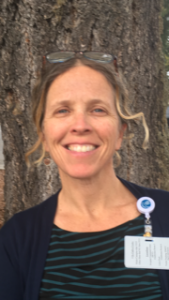It is rarely easy to face the thought of your own mortality. But life is often unpredictable, and it is certainly finite. Illnesses and accidents happen, and in the event you lose the ability to communicate the direction of your own medical care in a critical or life-threatening health situation, an advance care medical directive can speak for you.

PeaceHealth offers free advance care planning workshops, both online and in-person, to help anyone 18 years and older complete the required legal documents to solidify what kind of care they want, and who they want making medical decisions for them should they be unable to do so for themselves.
On Tuesday, Oct. 12, from 4 p.m. to 6 p.m., PeaceHealth will hold an in-person planning workshop at the United Fitness/Wellness Center at PeaceHealth United General Medical Center in Sedro-Woolley – the first in-person workshop since the COVID-19 pandemic moved all community classes and events online in 2020.
Advance care directives typically consist of two primary components, says Hilary Walker, PeaceHealth Northwest’s advance care planning program coordinator.
The first is designating a care agent: the person you’d trust to make medical decisions for you.
“It should be somebody you really trust, who you feel knows you the best,” Walker says. “If you lose capacity, then they do the best they can to decide what would be good for you.”
Many of these decisions come down to what a person is willing to go through to remain alive or to maintain a certain level of life quality.
Most states, including Washington, have a legal order to appoint a care agent. This means that, one way or the other, someone is legally obligated to make medical decisions on your behalf, even if that person is a complete stranger on a medical care team.
“If you don’t let us know who you trust to make decisions on your behalf, and put it in a legal document, then there is a legal order of decision-maker that we have to follow,” Walker says. “And for many people, that’s not who they want us to talk to.”
Advance Care Planning Workshop
October 12, 2021
4 p.m. – 6 p.m.
United Fitness/Wellness Center
2015 Hospital Drive, Sedro-Woolley
This is especially important in certain circumstances. For example, a life partner to whom you’re not married likely won’t have any right to guide your medical care unless you legally give them that power. Similarly, adults without children may have their care decisions default to parents. For some patients, whether estranged from parents or raised by other family members, this may not be desired.
For those who don’t have any family, or anyone deemed trustworthy enough to be designated an agent, it’s still critically important to document wishes in writing, the second part of a directive. This states what you want to happen in certain medical scenarios, such as needing cardio-pulmonary resuscitation (CPR) or other life support measures.
“If we don’t have anything that lets us know what someone values—what their spiritual, religious or personal beliefs are, or what their goals are—then we’re guessing,” Walker says. “And that gets really complicated for everyone involved.”
Walker, unfortunately, has seen this first-hand. When she worked for another hospital system, Walker encountered a scenario where a widowed, seriously-ill woman with five children had no designated care agent. Each child had different ideas about what care should be provided, leading to a scenario where the hospital’s ethics committee became involved in determining a solution.
The woman, her family, and her caregivers all suffered as a result.
“Because the conversation never happened, it prolonged her time in the hospital,” Walker says. “It created moral distress, not only within the family, but for her entire care team. It created a need for an ethics consult, and ultimately she died in the hospital, which was not what she wanted.”
That’s why advance care planning is so important, as it can help head off conflict and confusion in times of crisis. And these directives only come into play when you can’t inform your own care, meaning that if you’re able to consent to decisions, you don’t have to fall back on the directive.
At an advance care planning workshop, knowledgeable sources like Walker walk attendees step-by-step in filling out the legal documents, and answer any and all questions. A notary is also on hand so documents can be legally-enacted on the spot. No lawyers are needed to enact an advance care directive.

All that’s required of participants is registration and, for those who want to complete the documents, a government-issued photo ID. Online classes are taught the first Wednesday of every month at 1 p.m. Walker encourages attendees to bring along the person you wish to designate as your agent.
When people finally complete the course, and especially when the documents are notarized and take effect, Walker says they’re often incredibly relieved.
Advance care documents never expire and can be updated at any time. Generally, one should follow “the rule of 6 Ds,” Walker says. Updates should occur:
- Every decade
- If there’s been a divorce
- If there’s a new health diagnosis
- If there is a decline in health
- If a medical representative dies
- If distance becomes an issue due to a move.
Most states have advance care directives, but the documents and their provisions may differ.
While some people put off having tough conversations on this subject with loved ones, or readying care documents due to confusion over how to complete them, advance care workshops can make a world of difference to you and those you care about.
Because as the saying goes, it’s always too early, until it’s too late.
Sponsored





































